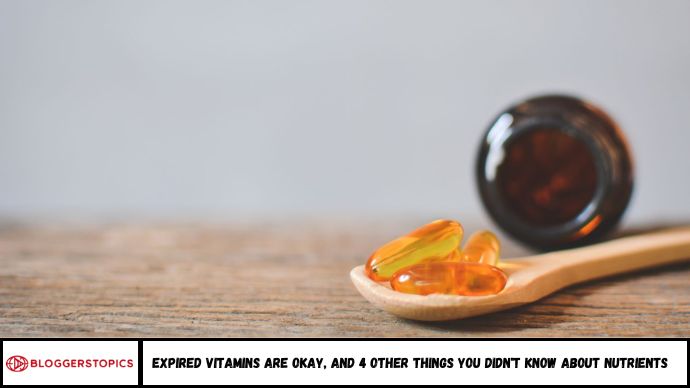Are expired vitamins still effective? Can you get too many nutrients? This article uncovers 5 surprising truths about vitamins and supplements, revealing what’s safe, what’s not, and how to get the most from your daily nutrients. Learn what the science says, backed by recent data, and upgrade your wellness routine today.
In 1912, Polish biochemist Kazimierz Funk made a groundbreaking discovery while studying brown rice. He identified a compound that seemed to prevent certain diseases and coined the term “vitamin” to describe it — short for vital amine. Funk’s insight sparked a wave of research, and by 1948, scientists had identified all the essential vitamins we know today.
By the 1950s, the mass production of vitamin supplements — including the first multivitamins — was underway. This marked a turning point: nutrition became more convenient and widely available, though not without questions about effectiveness, absorption, and long-term use.
Fast forward to today, multivitamins are a daily habit for millions, offering a convenient way to fill nutritional gaps. While food remains the best source of nutrients, multivitamins are often a cost-effective backup. But before you add one to your routine, there are a few important facts you should know.
Are You Wasting Money on Your Supplements?
Did you know that most people throw away expired vitamins without knowing if they’re still effective? Or that your daily multivitamin might not be doing what you think it is?
According to the National Institutes of Health, over 77% of U.S. adults use dietary supplements—yet most misunderstand how nutrients work in the body. In this article, we’ll bust five common myths and reveal truths that could save you money, improve your health, and help you make smarter supplement choices.
1. Expired Vitamins Are Often Still Safe to Use
Most vitamin bottles have an expiration date, but that doesn’t mean they “go bad” the way food does.
Here’s what you need to know:
- Expiration dates indicate potency, not safety.
The U.S. Food and Drug Administration (FDA) doesn’t require supplement expiration dates, but manufacturers include them to reflect maximum potency. - Vitamins don’t suddenly become harmful.
According to a study published in JAMA, many vitamins retain a significant amount of potency even years after expiration. - Exceptions exist.
Water-soluble vitamins like Vitamin C and B-complex may degrade faster, while fat-soluble vitamins like A, D, E, and K tend to last longer.
2. More Vitamins Doesn’t Mean Better Health
Popping extra supplements “just in case” may do more harm than good.
- Toxicity is real.
Fat-soluble vitamins can accumulate in the body and reach toxic levels. For example, excessive Vitamin A can cause liver damage or bone issues. - Over-supplementation wastes money.
The body can’t store excess water-soluble vitamins (like Vitamin C); it flushes them out through urine. - Balanced intake matters.
Nutrient synergy is key. Too much of one vitamin may block the absorption of another.
3. “Natural” Supplements Aren’t Always Better
Many assume that “natural” means safer or more effective. But the truth is nuanced:
- Natural and synthetic vitamins can be chemically identical.
For example, Vitamin C (ascorbic acid) is the same whether it comes from an orange or a lab. - Some natural forms may be less stable or harder to absorb.
- Regulation is limited.
Dietary supplements aren’t as tightly regulated as prescription drugs, regardless of their source.
4. You May Be Getting Enough Nutrients From Food
Despite aggressive marketing, not everyone needs supplements.
- Many Americans meet nutritional needs through diet alone.
The CDC reports that people with balanced diets often exceed daily requirements for several key nutrients. - Fortified foods add to daily intake.
Common items like cereals, juices, and plant-based milks are fortified with vitamins and minerals. - Supplements are most useful when correcting deficiencies.
Vegans may need B12, while those in northern climates often lack Vitamin D in winter.
5. Gut Health Impacts Vitamin Absorption
It’s not just what you take—it’s what your body absorbs.
- A healthy gut helps you get the most from nutrients.
Probiotics and fiber can improve nutrient bioavailability. - Medical conditions like celiac or IBS may limit absorption, increasing your need for supplementation.
- Taking supplements with food improves absorption, especially for fat-soluble vitamins.
FAQs
1. Is it safe to take expired vitamins?
Yes, they’re usually safe, though less potent.
2. Can I overdose on vitamins?
Yes, especially fat-soluble ones like A, D, E, and K.
3. Are natural vitamins better than synthetic ones?
Not always—both can be equally effective.
4. Do I need supplements if I eat healthy?
Maybe not; many people get enough from food.
5. What affects how well vitamins are absorbed?
Gut health, food intake, and medication interactions.
6. Should I take vitamins daily?
Only if recommended—get a blood test to be sure.
Conclusion
Vitamins and supplements are powerful tools—but only when used wisely. Don’t fall for myths or marketing hype. Know what your body needs, understand how nutrients work, and don’t fear expired vitamins. They’re often still effective.







